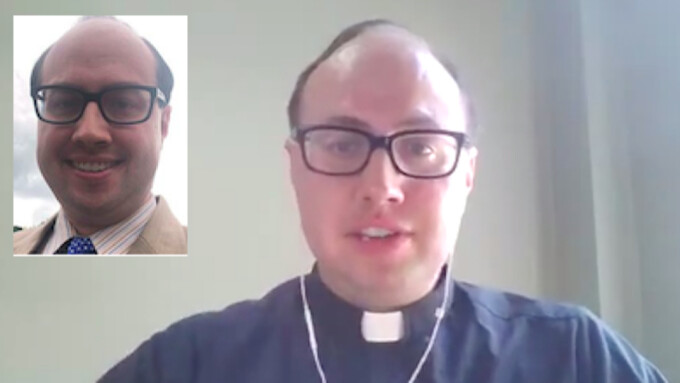WASHINGTON — The Washington Times published today an anti-porn propaganda piece titled “Former Porn Stars Recall Industry Abuses, Struggles” and quoting a handful of performers-turned-religious-crusaders who have not been active in the industry for over a decade — without disclosing that the author is actually a Catholic priest.
Writer Sean Salai is only listed by the Washington Times as “the general assignment/culture reporter for The Washington Times” and “a former National desk intern and Metro clerk at The Washington Times, [who] also has served as a City Hall reporter at the Boca Raton News and as a special contributor at America Media.”
But even the most cursory online search will reveal that Sean Salai, S.J., is in fact a Jesuit priest who promotes his book “What Would Pope Francis Do” through a Facebook page where he describes himself as “a longtime Jesuit and journalist with America Media” and author of a book on “how to ‘go to the margins’ like Pope Francis and the saints who formed him, offering a devotional edition of ‘The Spiritual Exercises of St. Ignatius’ to help.”
The Washington Times’ author page shows Salai wearing a secular suit and tie, in contrast to other videos readily available online, where he proudly dons clerical vestments.
The Washington Times — a conservative D.C. newspaper controlled by the family of Reverend Sun Myung Moon and a network of companies connected to the charismatic Korean evangelist’s Unification Church — does not clarify Salai’s priestly status, or the transparent religious motivation behind today's anti-porn feature.
Four Marginal Performers-Turned-Religious-Activists
Salai’s Washington Times article is built around the testimonies of four cis women — no male or trans performers are cited in this indictment of an entire industry — who have become religious anti-porn activists after short stints as performers as far back as 1985.
The article leads with a woman who performed under the name "Elizabeth Rollings" for a few months between 2006-2007, when she appeared in fewer than 30 BBW scenes, according to IAFD records.
After leaving the industry, Rollings reverted to her legal name of Jan Villarubia and became active in the Christian ministry Pink Cross, part of the so-called “sex worker rescue” industry.
Father Salai describes Villarubia as “one of a growing number of sex-trade survivors calling for tighter consent and age verification policies in the porn industry — and urging Congress to get behind the bipartisan Stop Internet Sexual Exploitation Act [SISEA], introduced by Sens. Ben Sasse, Nebraska Republican, and Jeff Merkley, Oregon Democrat, in December.”
“The crazy thing is that I’ve been out of the industry since 2007 and adamantly fighting injustices in it since 2008,” Villarubia tells the Jesuit journalist.
Anachronistic Testimonies About an Evolving Industry
Father Salai then links her comments about what she claims to have experienced in the long-gone era immediately before the rise of the tube sites to “the National Center on Sexual Exploitation (NCOSE) last week [asking] credit card giants Visa and Discover to follow the lead of Mastercard in requiring porn websites to more strongly verify the ‘unambiguous’ consent and age of performers in their videos.”
Father Salai quotes NCOSE’s CEO Dawn Hawkins, emphasizing the religiously-inspired group’s supposedly “nonpartisan” status. NCOSE was started by some of Father Salai’s fellow clergy members in 1961, and became prominent as Morality in Media before a rebranding in 2015 that concealed its religious roots.
Father Salai briefly quotes the Free Speech Coalition's Mike Stabile and spokespersons for Pornhub and OnlyFans, before turning again to the testimony of three additional marginal former performers. No active adult performer was interviewed by the Washington Times’ priest-writer.
Next was an uncheckable pseudonymous source whom Father Salai calls “Mary,” and who claims to be “an ex-performer in her 30s.”
“Mary” told Salai that she had been “a Los Angeles-based porn actress from 2005 to 2006,” when she “performed in a series of increasingly violent porn shoots that wounded her emotionally and physically.”
“Mary,” Father Salai reports, “eventually left the industry, sobered up and now has a ‘normal’ job that she loves.”
Conflating Porn With Sex Trafficking
Also quoted is Cyntoia Brown-Long, a survivor of sex trafficking who never worked in the adult industry but readily offered her opinion about “pornography” in general.
“I feel pornography encourages […] men to think it’s OK to treat women like sex commodities,” Brown-Long told the priest. “No human should be bought and sold — that’s a basic fact we should have learned by now.”
“Ms. Brown-Long takes a hardline stance on porn — make it illegal and shut down the websites,” Father Salai shared, without clarifying how such action would impact sex trafficking.
Closing With Exodus Cry
The final testimony offered by the Jesuit priest in support of legislation to establish a system for censorship of sexual expression is from Jewell Baraka, a 51-year-old who told him she was “active in porn from 1985 to 1988.”
“She now writes about her experiences online for Exodus Cry, a Christian advocacy group that seeks to reform the sex industry,” Father Salai added, before introducing one more interviewee — Laila Mickelwait, whose surname he misspells “Mikelwaite.”
The article fails to identify Mickelwait as an Exodus Cry mouthpiece; instead, the most vocal of current anti-porn crusaders is identified as the director of the Justice Defense Fund — a fundraising outfit for which she is currently requesting "investments" — and the signature-gatherer behind the #Traffickinghub petition.
The Washington Times has also recently been platforming the anti-porn writings of columnist Robert Knight, a cheerleader for “biblical investing” who also serves as a writer for “God-inspired” investment fund Timothy Partners, Ltd., one of Exodus Cry’s main backers.






